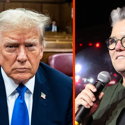 As the dust settles from the New Hampshire primary, the future direction of the Republican presidential race is even more muddled than it was before. The GOP party establishment had hoped that someone–preferably Marco Rubio–would emerge as a strong contender from the field of alleged moderates and that the race would quickly become a three-man circus: Donald Trump, Ted Cruz and the Great Establishment Hope.
As the dust settles from the New Hampshire primary, the future direction of the Republican presidential race is even more muddled than it was before. The GOP party establishment had hoped that someone–preferably Marco Rubio–would emerge as a strong contender from the field of alleged moderates and that the race would quickly become a three-man circus: Donald Trump, Ted Cruz and the Great Establishment Hope.
Hope is not a strategy, however, as voters in New Hampshire proved. Rubio set fire to his presidential hopes, and perhaps his entire political career, by revealing himself last Saturday to be a cyborg. Instead of finishing a second or a strong third, he finished fifth. Instead, Trump came in first, nearly 20 percentage points ahead of Ohio Gov. John Kasich. Even though New Hampshire is hardly a hotbed of evangelical voters, Ted Cruz finished a respectable third, closely followed by Jeb (the Invisible Man) Bush and Rubio.
What the Republicans have now is the worst possible scenario. Kasich put all his hopes on New Hampshire, and he didn’t score as well as the 2012 moderate, Jon Huntsman, whose campaign quickly petered out. Jeb Bush tried to make an 11% showing seem like Lazarus arising from the tomb.
The problem is that the primary now shifts to territory that doesn’t favor Kasich, Bush or Rubio: the south and west. The next big vote is in South Carolina, where Trump has been leading in the polls since last summer and where the conservative Christian voting bloc loves Cruz.
How about we take this to the next level?
Our newsletter is like a refreshing cocktail (or mocktail) of LGBTQ+ entertainment and pop culture, served up with a side of eye-candy.
The field is dwindling, but not enough. Chris Christie, who never had a chance to the be nominee, decided to call it quits, as did former Hewlett-Packard CEO Carly Fiorina. Yet Bush and Rubio in particular have enough money to keep campaigning for a while and every reason to hope that voters will think that maybe electability should be a consideration for choosing a candidate. But that would require a change in the structure of the race, and despite every prediction to the contrary, that has yet to happen.
The upshot is that Republicans may be heading into a two-man race with Trump and Cruz, the two candidates Republicans fear are least likely to win in November. It’s easy to see how either could win the nomination. For the rest of the field, the road to success is much less clear.
This dynamic is bad news. Cruz is a committed homophobe whose seems more interested in establishing a theocracy than winning the presidency. Trump’s ideology amounts to opportunism; he tailors his views to the moment. By his own admission, he’ll be a terrific president on gay rights, except that he would consider appointing judges who would overturn marriage equality.
If you think this is all good news for the Democrats, think again. The New Hampshire primary exposed a growing fault line in that party. It’s not just that Bernie Sanders won, which was expected. It’s that he won young voters and women by enormous margins. Hillary Clinton is still the odds-on favorite to win the nomination, but Democrats may be seeing the start of their own internal war pitting the establishment against revolutionaries.
What’s clear from this year’s presidential race is that the electorate is in a very different frame of mind this year. Conservatives and liberals are more open to populist messages about how the system isn’t working for them. How the candidates translate that fervor for principle into actual policy positions is going to be quite a spectacle–assuming they even try.



















Stephen Meeks
Finally? I thought that happened a good while ago.
Robert Barber
That horse left the barn long ago
1EqualityUSA
Ugh–idon’twantarevolution! The GOP super pac’s are sinking money into the Bern because they have a chance to beat him. Scary. Ralph Nader revisited. We’ll be bern victims if we let this goofball in. The next president will be replacing 3 to 4 Supreme Court justices.
The GOP will dig their heels in on abortion even if the Zika virus makes its way up from Central America. This will be interesting to watch. Maybe half-headed individuals fits right in with their voting demographics.
Kieran
The headline should read: “GOP Establishment has finally lost control of their party.” That is GOOD news. The People should decide who their nominee is going to be, not the Pay-To-Play donors, special interests groups or Party Bosses.
Alexander R. Rodriguez
Says the website who’s own party is gonna allow a full blown COMMIE to destroy our country. A crazed 74yo loon whoa running on SLAVERY REPARATIONS. Wanna change your story???
Alexander R. Rodriguez
“Lost control”
1EqualityUSA
Citizens United is a crime against Democracy. Gerrymandering is wrong, no matter who is doing it. Voter Suppression is a crime against Democracy. If big money laid off, the GOP wouldn’t be stuck with these unelectable idiots. Tea Partiers and the religious freakers have sent the GOP back to the stone age. The huge, white, entitled, raci$t, money backfired on the Republicans because Adelson, Koch bros, and others are out of touch. Ted Cruz? Marc Rube? Bush? wow. Back to the drawing board. GOP sucks.
Dakotahgeo
The Republican Party lost its soul and control long ago with the emergence of the TEA Party, the party with nothing but anger and fear for a platform. That will not cut it for the great majority of sane American citizens.
Dakotahgeo
Actually it may have had its roots in the Watergate scandal, and giving tRUMP top billing didn’t exactly help their image either.
1EqualityUSA
What fools these mortals be.
Michael1500
It is a fact that the Republican Party no longer exists. It dissipated around the time Richard Nixon finally revealed to the public that he was clinically insane. The Republican Party is now just a loosely held-together group of zealots who should be called the “I Hate the Democrats and All That They Stand For” Party.
JessPH
Trump and Kasich would be the least threatening to LGBT rights. I hope either of them gets nominated.
1EqualityUSA
What justices would be chosen for the Supreme Court? Presidents leave, the justices they usher in don’t.
Mike Hall
Bless your heart. Perhaps we could have left George HW Bush in the White House four more years instead of Clinton? That probably would have been just long enough to wipe homosexuals off the map because of 12 years of Republican inaction, Alex.
Queer Comedy
I think the Republican party lost control when they decided to put Caribou Barbie on the ticket back in 2008.
Kangol
@JessPH: Are you out of your mind?
John Kasich’s opposition to same-sex marriage led to the Obergefell v. Hodges (originally Obergefell v. Kasich) decision to uphold same sex marriage!
Kasich is an avowed homophobe who has repeatedly spoken against and pushed policies to deny LGBTIQ equality.
Just Google this stuff, it’s easy to find.
PLEASE, LGBTIQ people, do not listen to dingbat media people who claim someone like Kasich is “moderate.” Compared to Trump, Cruz, Rubio, etc., yes. Compared to moderate Republicans of the past or even many conservative Democrats, this man is right-wing, and he’s NO friend of the LGBTIQ community!
Kangol
@Alexander R. Rodriguez: Can you read?
Bernie Sanders is AGAINST slavery reparations, which in any case never occurred, helping the people who run Aetna, Lehman Brothers, and other companies earn billions over the last 150 years while never addressing their complicity in the legalized system of chattel slavery and its segregationist aftermath.
At any rate, Sanders is against reparations. Easy to find online, look it up.
captainburrito
Why does the Repub establishment want Rubio to win? I understand Trump is not their cup of tea, but why not Ted Cruz? I thought he would naturally be their favourite or is he too extreme even for them?
Kangol
@captainburrito: Ted Cruz is too extreme and has a horrible personality. He also would not go along with their immigration boondoggle; they want massive visa immigration to depress US wages in the tech and banking fields, and guest workers for agriculture. Trump is completely against this (though he used undocumented workers in the past), and Cruz has taken an extreme position now too.
La Rubia is wishy washy on this issue but probably would go along with the establishment. Also, his tax plan would pour many, many more millions into the pockets of billionaires and corporations while doing zilch for everyone else. Lastly, he successfully sabotaged a component of Obamacare, which the GOP establishment wants repealed, even though it is based on a conservative plan, because they hate the taxes it levies on the upper 1%. They have no problem with the status quo ante, when 17+ million people did not have health care insurance they now have, there were limits if you had pre-existing conditions, etc. They’re rich so they could afford to go to Canada, the UK, Switzerland, wherever to get the treatment they needed.
kayakriver
TRUMP all the way. He won’t be against gay rights. He wants to make the country strong. Go for it.
Bob LaBlah
@Kangol: “Bernie Sanders is AGAINST slavery reparations,”
Reparations will open the flood gates to those who were wronged in the past while the country was in its infancy. How many whited died while in servitude to other whites. They were literally slaves themselves who could be arrested and returned to their “sponsors” after serving their sentence. Rest assured the last thing the government wants is for the Indians to begin walking that same path. It is best to leave it as it is.
SpunkyBunks
@kayakriver: If these idiot Muslims perform another terrorist attack before the elections, which is highly probable, Trump will be our next elected leader since he’s the only one speaking against them.
Hillary is already toast. Her supporters are older white feminist females and middle aged gay men. That’s not enough support. Bernie has the youth vote, but he loves Muslims. Which is a no-no.
Uncle Mark
@captainburrito: Apart from Ted Cruz representing the extreme right Tea Party (which has caused no end of trouble for the GOP,) Ted Cruz has a reputation of being a self-serving opportunist, and difficult to work with…even with GOP members. In Oct 2013, he lied to his own fellow-Republicans in the House, telling them to vote to defund the ACA in a crucial omnibus bill, assuring them that he had the votes in the Senate to override a Presidential veto. The moment the House completed voting, he told his fellow Republicans in the House that he was mistaken about the Senate support…Ooops. This lead to a gov’t shutdown, costing the country $24 Billion, while Cruz disappeared to raise money for himself. It took Republicans a full year to recover from that in public opinion polls. Then there was the time last year, when he called the Republican Senate Majority Whip “a liar” on the Senate floor. Clearly the man shows a disregard for his party, as well as his party bosses, and generally does not play nice with others.
Uncle Mark
@SpunkyBunks: As a middle-aged gay man, I resent your throwing me in your weak-ass generalization casting me as a Hillary supporter. My middle-aged gay friends and I are probably more aware of her history (having lived it) than you, which is why we are Bernie supporters !! Frankly, you should be rather careful before casually lumping the gay community into a statistical category, as you should be well-aware, we are a very diverse group.
Brian
Well, the Democrats aren’t doing too well, either. I have a feeling Trump will win the Presidency with or without the approval of the Republican establishment.
Irish Ryan
This is a good thing because the GOP base has been demanding action in reducing the National Debt and enforcing our immigration laws and the RHINOS in control just laugh at them.Who is laughing now.
Alistair Wiseman
“GOP DEATH WATCH”
Really Queerty, where do you get this “deep” political analysis?
It is called a primary season and I’ve never known one to be pretty.
You want to talk about a “DEATH WATCH”, you need to look at you own party.
Under President Obama, the Democrats have lost majorities in the House, the Senate, the majority of governorships and the majority of state legislatures. Since Obama has taken office, Democrats have lost over 1,000 state and federal seats. “GOP DEATH WATCH”? Hardly.
Let’s look at what is happening currently with the Democratic Party. Your party has moved so far left that one of your primary candidates calls himself a “Democratic Soci@list”. He is a Soci@list (the “democratic” just makes it go down a little easier for some).
One of the great liberal icons of the 20th Century, John F. Kennedy, would not recognize or understand what has happened to his party today. In fact, President Kennedy would not even be able to receive the party’s nomination in 2016. Can you imagine the results of a soci@list running when Kennedy won the 1960 presidential election? (Actually we can, Eric Hass, the Soci@list Labor Party candidate received 0.07% and Farrell Dobbs, the Soci@list Workers Party candidate received 0.06% in the 1960 presidential election.)
The fact remains, the Democratic Party has veered so far left that neither the Chair of the Democratic National Committee, Debbie Wasserman Schultz, nor Hillary Clinton could explain the difference between a Soci@list and a Democrat to Chris Matthews recently.
The reason they can’t explain it? Is because there is no difference.
https://youtu.be/aqq5q11uK0M
1EqualityUSA
Queerty has been using, “GOP Death Watch” for years. They haven’t been wrong yet. I love this segment and its name. Agonal breathing is more like it.
darian
Dear Republican establishment, those fanned flames burn don’t it.
P.s.
Rest in shit.
Clark
The Antique Road Show is running the democrats and you say the GOP is on death watch? Try nominating someone besides a hag under federal investigation or a bonifide kook to follow the most lawless administration in history and you might have some legitimacy to your headline. Until then …. Keep to your shallow stories you’re much better at the surface stuff.
Clark
@Alistair Wiseman: @Alistair Wiseman: Wow a thinking person on this site….here’s a first!
Clark
@1EqualityUSA: Ha… ” big money ” apparently you’ve been looking up Hilary’s pantsuit.
o.codone
@kayakriver: You said: “TRUMP all the way. He won’t be against gay rights. He wants to make the country strong. Go for it”. NO, NO, NO, NO, NO. You can’t say that here. This is a gay site. We know that the gays are all about Hillary and that weekend at Bernie’s character, but definitely NOT about TRUMP. So, no, you can’t say that here. Meanwhile, half of these Mary’s are going to vote for Trump because they don’t want gay hating Syrians on welfare allowed in the country. But they won’t say it here, you can’t support Trump here. This is a gay site. Gays are intolerant of anything that’s not all about the Democrat party.
I have to laugh about the Republicans losing control. Yeah, they lost control but that was a ways back when they nominated idiots like John McCain and Bob Dole as candidates. But now, now there’s a real candidate, one that democrats can cross-over to support, one who’s gonna win, one who will not hurt gays, and girls, it’s time to vote for him. Vote for Trump. And, we know you will, it’s just that you cannot say that on here.
Ashley Marie Limon
They had control of it to begin with?
Nahald
The repukelicans have the GREAT DIVIDER Trump as their leading candidate with the public anyway, so what more would you expect? They are dooming themselves to the history books.
1EqualityUSA
Yes, get stuck with another Scalia, Alito, Thomas, Roberts for decades to come. What? Hobby-lobby wasn’t enough? Citizens United? Gutting the Voter Rights Act? Presidents come and go, SCOTUS stays behind doing decades of damage to our efforts of maintaining our equality. These brutal poodles would send us back to the Lawrence vs Texas days. No. Democrat all the way.
zooby
@o.codone: He won’t be against gay rights? You do realize he said the other week that he hopes the supreme court justice he appoints will overturn the marriage decision, right? You’re an idiot if you think Trump will do more for LGBTs than any Dem candidate. Then again, Trump supporters aren’t exactly known for being educated and smart.
Stefano
LGBT in the US are screwed ! You thought that you lived in a progressive society…well you’re NOT ! Have fun !
o.codone
@zooby: educated and smart like the people who voted for Obama? yeah, like that. Please girl. You need to realize that educated and smart has nothing to do with voting, it’s all about popularity and how you “feel” about the candidate. You don’t have to actually know anything about politics or the candidate, you just have to like his face or feel like he’s a good guy or gal. You’ve seen those gag videos on youtube where the guy asks college kids if they support Hillary’s VP, Karl Marx, and they all said yes, or when the guy asked if they supported Hillary’s endorsement of Sharia law and they all said yes. This is the voting public. Idiots. And, what about you, re you “educated and smart”?
Kangol
Dear @o.codone: and @kayakriver:, here’s what your fave Donald Trump has said about LGBT people, rights and equality:
“I’m not in favor of gay marriage. They should not be able to marry.”
“I just don’t feel good about it. I don’t feel right about it. I’m against it… I’m opposed to gay marriage.”
Also, just days ago Trump tweeted: ““Lying Cruz put out a statement, ‘Trump & [Marco] Rubio are w/Obama on gay marriage.’ Cruz is the worst liar, crazy or very dishonest. Perhaps all 3?”
DO YOU AGREE WITH HIS HOMOPHOBIC BELIEFS?
And: — On June 26, 2015, following the Obergefell v. Hodges ruling, Trump tweeted, “Once again the Bush appointed Supreme Court Justice John Roberts has let us down. Jeb pushed him hard! Remember!”[44]
— On the issue of gay marriage, Donald Trump said during a November 2013 interview on MSNBC, “I think I’m evolving, and I think I’m a very fair person, but I have been for traditional marriage. I am for traditional marriage, I am for a marriage between a man and a woman.”[45]
— In a March 2011 interview with The Des Moines Register, Trump said gay couples should not be allowed to marry or receive the same benefits as married heterosexual couples.[46]
So what about Donald Trump’s anti-gay policies do you not grasp? Or are you so enamored of his r@cism and homophobia, complete lack of substance, and quasi-billionaire economic status, that you’re willing to support him despite the clearly expressed anti-gay stances? Just wondering?
1EqualityUSA
Kangol, Thank you. Your words helped me choke down my AllBran this morning. Lightly sweetened driveway sweepings. I must finish a house project. Carry on, Kangol, and thank you. Watch the debate from PBS, Feb 11, 2016. Woof. Turning point.
o.codone
@Kangol: aren’t you one of the people who voted for Obama while he was quacking about marriage being between a man and a woma? YES, you were. And Hillary was very late to the party if I remember correctly, and that hasn’t stopped you from supporting her has it? so think before you start typing my friend.
finally, nobody cares about the issues, gays vote democrat no matter what (you’ve already proved this point with your Obama vote. You settled for him instead of demanding a candidate who represented your political goals. To quote Mr. Trump, you’re a pus*sy.). I will never vote democrat, ever. don’t be surprised to see as much as 20% of democrats cross over and vote for Trump, that happened with Ronald Reagan. I will vote for Trump no matter what, just as you have voted in the past and just as you are going to vote this time… for a democrat, no matter what.
Kangol
@o.codone: First, you don’t know me, and do NOT use homophobic and misogynist language towards me. You need to check yourself before you wreck yourself, my friend.
Second, Barack Obama supported LGBTIQ rights and same-sex marriage when he was a Illinois State Senator. You may not know this so look it up. Barack Obama also turned out to be the most pro-gay president we have ever witnessed in US history, and supported gay rights as a US Senator and when he took office in 2008. There is nothing in Donald Trump’s record, beyond his attending gay weddings, to suggest anything similar. Also, neither Barack Obama or Hillary Clinton (as awful as she has been on racial issues at times) has EVER spewed hate speech like your beloved Trump. Nor are either of them the children of a KKK member.
I may or may not vote for Hillary Clinton the primary; right now I support Bernie Sanders. In the general election I will vote for anyone to the left of the GOP, which has destroyed this country and pushed anti-gay, r@cist and sexist policies repeatedly during the time I’ve been on this earth. Oh, and endless wars, to top it off. I also have voted for candidates to the left of the Democrats, or not voted at all at times because there were no options. So don’t make claims about me that you cannot back up. You are one of those gay people who actively votes against his or her own interests, and you’ll have to live with the consequences.
robho3
All the canditates on both sides suck. I think we all might want to prepare for a new 4 year reality show called President Donald Trump. It should be very entertaining. As for me I think I’ll move to Canada.
Stefano
@Kangol: Bravo Kangol !
o.codone
@Kangol: i really do not have time for a thoughtful response. however, i would need to know what misogynist and homophobic language i used against you. second what you say about obama supporting gay marriage is just untrue. and finally you tell me i’m supporting a candidate who will act against my interests as a fag, and I will say the same to you. when democrats bring in anti-gay muslims who will actively try to kill us, i would remind you that you voted for the person, hillary or bernie who brought them in. and the guy above who is high fiving you “Bravo Kangol” is actually a guy who was already thrown off this site twice and so, this time around, if i were you I would mind your manners unless you want to go for three. thank you gentlemen.
Dakotahgeo
@o.codone: As a real refreshing experience, if you left this website permanently, it would be most healthy for all people concerned. Sometimes even you aren’t sure of what you believe in!
Stefano
@o.codone: sorry but i wasn’t ‘thrown’ of this site…ever. I comment on Queerty since 2014. You invent a lot of things without any proof. You are like a rabid dog.
Dakotahgeo
Stephano, o.codone doesn’t even have the qualities of a dog… he should be so fortunate! The poor slug is a lost soul.
o.codone
@Kangol:
so, I looked it up, and here’s what I already knew, which is that you’re talking out your azz.
http://www.politifact.com/truth-o-meter/statements/2012/may/11/barack-obama/president-barack-obamas-shift-gay-marriage/
1EqualityUSA
o.maggie, That you are still digging around in the pen, looking for ancient truffles, says volumes. The Republicans have nothing to offer, so the Zikans still supporting this obsolete party, having nothing to say, go back in time and harvest little nothings to cough up hairball-like in 2016. Time to move along…there’s nothing to see here. GOP are nothing-burgers, and your stories, though quaint, amount to nothing.